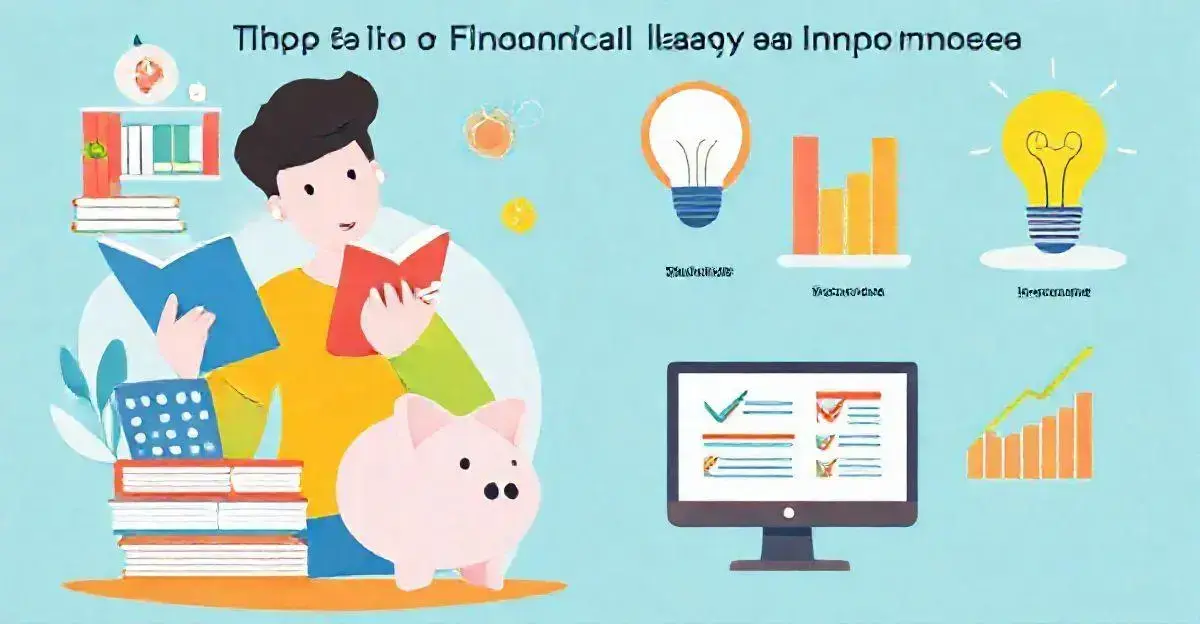Why is personal finance important? Understanding personal finance is key to shaping a secure financial future. It goes beyond just saving money; it’s about managing your resources wisely, setting goals, and making informed decisions that enhance your life.
When you master personal finance, you gain the power to make smarter choices about spending and saving. This knowledge helps you avoid common traps like debt and poor budgeting, leading to greater financial stability.
Ready to discover how mastering personal finance can change your life? Let’s dive into the benefits of financial education and explore practical strategies to reach your financial goals.
Understanding Personal Finance
Understanding personal finance is essential for achieving financial stability and success. But why is personal finance important? It involves recognizing how to manage your income, expenses, savings, and investments effectively.
Budgeting is a core component that helps individuals track their spending and allocate funds to necessary categories.
Furthermore, understanding personal finance enables individuals to set financial goals, such as saving for a home, retirement, or education. By being aware of your financial situation, you can make informed decisions about borrowing, investing, and saving.
Knowledge of personal finance also prevents common pitfalls like overspending and accumulating debt. Debt management strategies, such as paying off high-interest loans first, can lead to improved credit scores and better loan terms in the future.
Additionally, personal finance wisdom empowers you to plan for emergencies through emergency funds. Having savings set aside can mitigate financial stress when unexpected expenses arise.
Investing knowledge is another crucial aspect, as understanding different types of investments can help grow your wealth over time. Being informed allows you to evaluate risks and returns, ensuring your investment strategy aligns with your long-term financial objectives.
Benefits of Personal Finance Education

Benefits of personal finance education are numerous and impactful. When individuals understand the basics of managing their finances, they set themselves up for success.
One key benefit is the ability to make informed decisions about spending, saving, and investing, which raises the question: why is personal finance important? This education helps to build a strong financial foundation.
Moreover, personal finance education promotes financial literacy, which is crucial in today’s economy. It allows individuals to comprehend loan terms, interest rates, and investment options. This knowledge leads to better outcomes and less vulnerability to financial pitfalls.
Additionally, possessing this knowledge fosters confidence in handling financial situations. With a solid understanding, individuals are less likely to fall prey to debt and fraud. They learn how to budget effectively, track expenses, and build savings.
Another significant benefit is the empowerment that comes from understanding financial goals. Educated individuals are more likely to set realistic goals and develop plans to achieve them, whether it’s buying a house, funding education, or saving for retirement.
Lastly, personal finance education can lead to long-term wealth accumulation. It teaches the importance of investing early, diversifying portfolios, and taking calculated risks, which can greatly enhance one’s financial future.
Consequences of Ignoring Personal Finance
Ignoring personal finance can have serious consequences. When individuals do not manage their finances, they are often unprepared for unexpected expenses.
Without a budget, it’s easy to overspend and accumulate debt, raising the question of why is personal finance important? This can lead to high-interest rates and a cycle of financial stress.
Another consequence is the lack of savings. Failing to save for emergencies means that a minor setback can quickly become a major crisis. Having no emergency fund can result in taking on debt just to cover basic needs.
Moreover, without a grasp of personal finance, individuals may miss out on investment opportunities. Understanding how to invest is key to wealth building, and neglecting this knowledge can hinder long-term financial growth.
Additionally, the inability to plan for the future can lead to inadequate retirement savings. Many people who ignore personal finance end up relying solely on social security, which is often not enough to maintain their lifestyle.
Lastly, a lack of financial understanding can lead to poor decision-making. This includes making uninformed choices about loans, credit cards, and investments, which can have lasting impacts on one’s financial health.
Setting Financial Goals

Setting financial goals is a crucial part of personal finance. It helps individuals create a clear path for their money and make informed decisions.
Short-term goals might include saving for a vacation or paying off a credit card. These can motivate you to stay on track and manage your expenses wisely, which raises the question of why is personal finance important?
On the other hand, long-term goals involve more significant achievements, such as buying a house or saving for retirement. These goals require careful planning and a commitment to consistent saving and investing.
To set effective financial goals, it is essential to follow the SMART criteria: Specific, Measurable, Achievable, Relevant, and Time-bound. For example, rather than saying, “I want to save money,” a SMART goal would be, “I will save $5,000 for a car in the next 12 months.” This approach provides clarity and helps track progress.
Additionally, writing down your goals can increase accountability. Reviewing and updating these goals regularly keeps you engaged and focused on your financial journey. Celebrating small milestones along the way can also boost motivation and commitment to reaching larger targets.
In summary, setting financial goals is an invaluable strategy that leads to better financial management. By being intentional and proactive about your money, you can create the future you desire.
Budgeting Basics for Everyone
Budgeting basics are crucial for managing your finances effectively. A budget is a plan that helps you track your income and expenses, highlighting why is personal finance important.
By knowing where your money goes, you can make better financial decisions. Creating a budget starts with listing all sources of income, such as salary, freelance work, or any side jobs.
Next, categorize your expenses into fixed and variable costs. Fixed expenses include rent or mortgage, insurance, and loan payments. Variable expenses cover groceries, entertainment, and dining out. Tracking both types helps you understand your spending habits.
Once you have a clear picture, set limits for your variable expenses. This is where self-discipline comes into play. Stick to your limits and adjust as needed. Using apps or spreadsheets can simplify the process, making it easier to monitor your budget.
Additionally, it’s important to include savings in your budget. Aim to save at least 20% of your income. This will build an emergency fund and help you reach financial goals, such as vacations or retirement.
Review your budget regularly. Monthly check-ins can help you stay on track and make adjustments if your financial situation changes.
Investment Strategies for Beginners

Investment strategies for beginners are essential to build wealth over time. The first step is to understand the importance of risk tolerance. Knowing how much risk you can handle helps in choosing the right investments.
Generally, younger investors can take more risks, while those nearing retirement may want to be more conservative. A popular strategy for beginners is to diversify your investments. This means spreading your money across different asset classes, such as stocks, bonds, and real estate.
Diversification can reduce risk since different investments often react differently to market changes. Another effective strategy is to start with low-cost index funds or exchange-traded funds (ETFs).
These funds track the performance of a specific index and offer a way to invest in a broad range of stocks without picking individual ones. They typically have lower fees compared to actively managed funds.
It’s also beneficial to practice dollar-cost averaging. This strategy involves investing a fixed amount of money regularly, regardless of market conditions. This approach can lower the average cost of your investments over time and diminish the impact of market volatility.
Setting clear investment goals is crucial as well. Determine what you are saving for, such as retirement, a home, or education. Having specific goals helps tailor your investment strategy to meet those objectives.
Finally, always keep learning about investing. The more knowledge you have, the better decisions you can make.
Building Wealth Through Smart Savings
Building wealth through smart savings is a fundamental part of personal finance, highlighting why is personal finance important. It starts with understanding the significance of saving money regularly.
The first step is to create a dedicated savings account that earns interest, which helps your money grow over time. Consistent saving is key; aim to set aside at least 20% of your income each month.
Another effective method is to automate your savings. Setting up automatic transfers from your checking account to your savings account ensures that you save without having to think about it. This approach eliminates the temptation to spend the money instead.
Consider using a high-yield savings account. These accounts offer better interest rates compared to regular savings accounts, allowing your savings to grow faster. Also, regularly review and update your savings goals. Whether it’s for a vacation, a new car, or a safety net, having clear goals keeps you motivated.
Using savings apps can also help you track your progress. Many apps offer features that round up your purchases and save the change. This makes saving easy and fun. Lastly, remember that saving money is a lifelong practice. The sooner you start, the more wealth you can build over time.
Tips for Financial Literacy Improvement

Improving financial literacy is vital for making informed financial decisions, which is why personal finance important. Here are some tips to enhance your knowledge. First, start by reading books about personal finance.
Many authors provide great insights into budgeting, saving, and investing. Choose beginner-friendly materials to ease into the topic.
Next, attend workshops or webinars focused on financial education. These events often present information in a clear and engaging way. Many community centers and libraries offer free or low-cost sessions.
Another helpful tip is to follow reliable financial blogs and podcasts. These resources can provide ongoing education and current trends in finance. Engage with the content by taking notes and applying what you learn to your own finances.
Consider using financial apps that promote learning. Many apps offer features that guide you through budgeting and saving while educating you along the way. Utilize these tools to track your progress.
Finally, discuss money matters with family and friends. Sharing knowledge and experiences can lead to better understanding and different perspectives on financial issues. Remember, improving your financial literacy is a continuous journey.
In Conclusion: Why is Personal Finance Important?
Understanding personal finance is crucial for achieving a secure and prosperous future. Through smart savings, effective budgeting, and investing, individuals can build wealth and reach their financial goals.
By educating yourself on financial matters and setting clear objectives, you can navigate both short-term and long-term financial challenges. Improving your financial literacy can empower you to make informed decisions and take control of your financial journey.
Remember, the sooner you start applying these principles, the greater your chances of success. Embrace the journey of financial education and let it lead you to a brighter financial future.